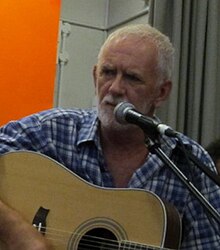1957–1961
Davis was born in Smithdown Hospital, Sefton, Liverpool. Davis played in a jazz trio whilst at school with Gerald Greenwood (piano) and Les Brough (drums). [1] Rod was attending Quarry Bank High School, when he was asked to join the Quarrymen in 1957, along with Colin Hanton, as their banjo player: [1]
I lived in Woolton and first met John Lennon, Pete Shotton, Nigel Walley, Ivan Vaughan and Geoff Rhind at St. Peter's Sunday School when we were very small boys. I lived near Colin Hanton and we used to play street football together. I met Eric Griffiths when we both started at Quarry Bank School, and Len Garry when he became the Quarrymen's tea-chest bass player. Eric invited me to join the Quarrymen in early 1956 just after I bought a banjo.
The group, consisting of John Lennon, Eric Griffiths, Pete Shotton, Len Garry, Colin Hanton, and Davis, formed the first stable line-up of the group. Davis' tenure with the group was short, and he and Pete Shotton, left in August 1957, feeling that the group was moving away from skiffle and towards rock, leaving their instruments superfluous. [2]
Davis would make a record in 1961 as part of a band called the Trad Grads, by which time he played mandolin, fiddle, banjo, guitar, concertina, and melodeon. In a 1997 issue of Record Collector, he said that when he told Lennon about this in early 1962, Lennon "said, 'You don't play the drums, do you? We need a drummer to take back to Hamburg.'" Davis, who had gone on to attend Cambridge University, declined Lennon’s offer, allowing the Beatles to recruit Pete Best. The two men lost contact after this. [3]
1994–present
In 1997, Davis reunited with surviving members of the Quarrymen to perform a concert, to commemorate 40 years since the group's formation. [4] They embarked on a tour which took place in the United Kingdom, United States, Germany, and Japan, among many others. Davis has participated on all Quarrymen releases since; including their three albums; Get Back – Together (1997), Songs We Remember (2004), and Grey Album (2012). Their recent material primarily consists of rock and roll and skiffle songs from the 1950s.
Davis was portrayed by actor James Jack Bentham in the 2009 biopic Nowhere Boy . [5]
The Quarrymen performed in New York City, for what would have been Lennon's 70th birthday in 2010. [4]
As of 2016, Davis still tours with founding member Colin Hanton and Len Garry.
